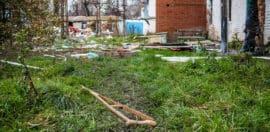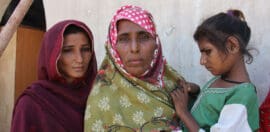Australia joins international effort to curb ‘deplorable abuses’ in the aid sector

15 July 2019 at 4:20 pm
Almost 30 countries including Australia have agreed to hold themselves accountable for tackling sexual abuse in the aid sector with the signing of new international standards.
The OECD’s Development Assistance Committee (DAC) – 29 donor countries and the EU – committed last week to a set of recommendations aimed at preventing sexual exploitation, abuse and harassment in the delivery of humanitarian aid.
It comes at a time when sexual abuse in the aid sector is firmly in the public spotlight, following revelations last year that Oxfam UK senior staff hired sex workers during the Haiti earthquake response.
The Australian aid sector – which itself has uncovered dozens of alleged incidents of sexual misconduct – has welcomed the recommendations and vowed to keep the nation at the forefront of action to prevent abuse.
DAC chair Susanna Moorehead said this agreement was momentous for the DAC and the entire aid community.
“The DAC is the first multilateral body to agree to hold ourselves to account in the battle to eradicate sexual exploitation and abuse,” Moorehead said.
“But success depends on DAC members actually implementing this recommendation, as well as a cultural shift in organisations and a permanent behavioural change by perpetrators.”
Just Out: The #OECDDAC has adopted the 1⃣st international instrument to end #sexualexploitation, abuse, and harassment in #development co-operation and #humanitarian assistance. #aidtoo #HLPF2019
Read the DAC Recommendation here 👉https://t.co/WRaF1Dz3cJ pic.twitter.com/fgMsqYwOxx
— OECD on Development (@OECDdev) July 12, 2019
The standards are designed to be used by national aid agencies when working with NGOs running development programs. It includes a clear framework that puts the needs of survivors first.
The recommendations state that countries should develop policies and ethical standards to prevent sexual abuse in the sector, and make it clear that failure to respond appropriately to abuse will not be tolerated.
It said organisations should develop reporting and response protocols that include clear guidelines for staff on when and whom to report to and how senior leaders can respond in a confidential and sensitive manner.
It also said there should be protection for those who report sexual abuse, and minimum standards for assisting victims that includes financial support.
Jorge Moreira da Silva, OECD director of development co-operation, said there was a clear acknowledgement that the entire aid community was accountable for the “deplorable abuses by some aid workers against people in the most vulnerable contexts”.
“Long-overdue fixes need to be made at every point of the responsibility chain – in aid policies, aid delivery, and support for victims and survivors,” da Silva said.
The Australian Council for International Development (ACFID) last year commissioned an independent review into sexual misconduct in the aid sector, which found 76 alleged incidents of sexual misconduct by aid workers over a three year period.
As part of its ongoing response to the review, ACFID has updated its code of conduct so that all members are required to have a Prevention of Sexual Exploitation and Abuse (PSEA) policy operating within their organisation.
Jocelyn Condon, ACFID’s director of development effectiveness, told Pro Bono News she welcomed the DAC agreement.
She said ACFID will continue to work closely with the Australian government to implement the recommendations, including the establishment of comprehensive reporting schemes.
“We [want] to ensure Australia remains at the forefront of action to prevent the exploitation of vulnerable persons, recognising the importance of supporting civil society to strengthen systems and response in that action,” Condon said.
“As the DAC has stated structural inequality, especially gender inequality, gives rise to gender-based violence and others forms of violence and discrimination.
“To transform structural inequity, we must all work harder to challenge gendered power relations and individual and systemic gender norms.”
Pro Bono News has approached the Department of Foreign Affairs and Trade for comment.








